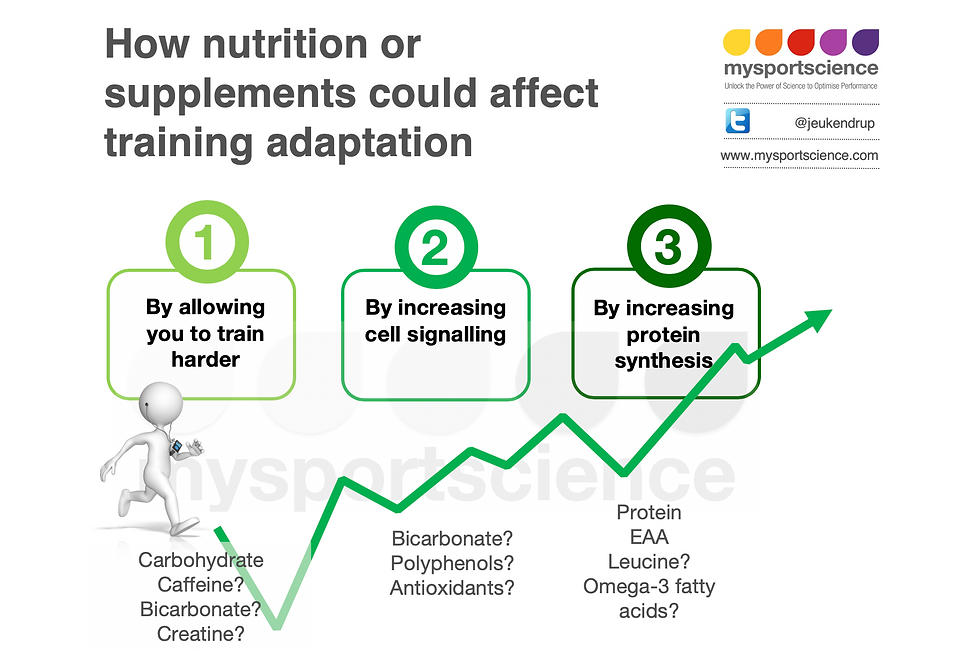Beetroot juice improves intermittent exercise and cognitive performance
- Asker Jeukendrup
- May 3, 2020
- 3 min read

More benefits from beetroot juice? In a paper just published in the European Journal of Applied Physiology Professor Andrew Jones and his team from the University of Exeter in the UK studied the effects of dietary nitrate supplementation (beet root juice) on repeated sprint performance and cognitive function. The findings suggest that beetroot juice can enhance repeated sprint performance and may attenuate the decline in cognitive function (and specifically reaction time) that may occur during prolonged intermittent exercise. Although the study did not directly study team sports performance, it is clear that these findings might be highly relevant for such sports, as well as other sports with of an intermittent nature.

Nitrates
Dietary nitrate is growing in popularity as a sports nutrition supplement. A lot has been written about beetroot juice (with nitrates as the active compound) and its effects on performance. Nitrate is present in numerous foodstuffs and is abundant in green leafy vegetables and beetroot. Following ingestion, nitrate is converted in the body to nitrite and stored and circulated in the blood. In conditions of low oxygen availability, nitrite can be converted into nitric oxide. Nitric oxide is known to play a number of important roles in the regulation of blood flow and metabolism. Studies have shown that dietary nitrate supplementation increases the concentration of nitrite in the blood and reduces resting blood pressure. It has also been shown that nitrate supplementation can reduce the oxygen cost of submaximal exercise and can, in some circumstances, enhance exercise tolerance and performance. The performance benefits are particularly seen during all-out exercise lasting 5-30 min.
The new study
Because of the potential effects of nitrate on blood flow, it is possible that they can also enhance blood flow to the brain and improve brain function, by facilitating the supply of oxygen and nutrients to the brain. This was one of the purposes of the study conducted by Chris Thompson and his colleagues at the University of Exeter.
In a double-blind randomised crossover study, 16 male team-sport players received nitrate rich or nitrate depleted beetroot juice (placebo) for 7 days. The participants could not tell whether they were receiving beetroot juice with or without nitrates, and neither could the investigators. The order of the trials was randomised to avoid learning or training effects. Each participant served as its own control and performed all tests twice: once with nitrate rich beetroot juice and once with placebo. The total amount of nitrate ingested was around 800 milligrams, so a fairy large dose, the equivalent of roughly 1 liter (34 oz) of beetroot juice per day. On day 7 of supplementation, subjects completed an intermittent exercise test. This test consisted of two 40 minute periods of repeated 2 minute blocks with a 6 seconds “all-out” sprint, 100 seconds active recovery and 20 seconds of rest. All tests were performed on a cycle ergometer during which the participants performed a range of cognitive tasks.
Enhanced performance and cognitive function
What did the study find? First of all the total work done during the sprints was greater with the nitrate rich beetroot juice. In addition, reaction time of response to the cognitive tasks in the second half of the intermitten exercise protocol was improved with beetroot juice compared to placebo. There was no difference in response accuracy. It was therefore concluded that dietary nitrate enhances repeated sprint performance and may attenuate the decline in cognitive function (and specifically reaction time) that may occur during prolonged intermittent exercise. I am sure we will learn more about nitrates and cognitive function in the years to come.
References
For a more detailed review on the effects of nitrates on performance, here is a link to an open access publication by Professor Andy Jones:





Comments